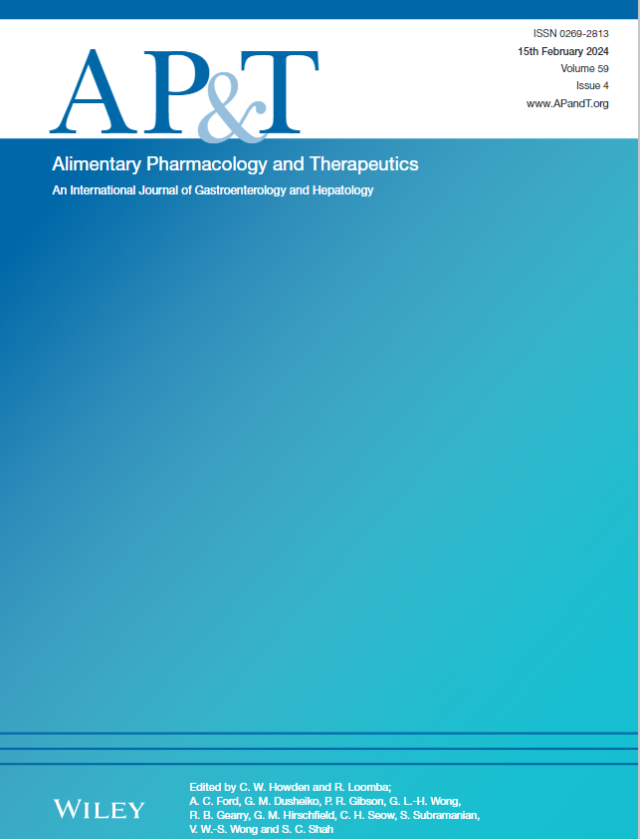Tenofovir Alafenamide Therapy Throughout Pregnancy in Mothers With Hepatitis B
IF 6.6
1区 医学
Q1 GASTROENTEROLOGY & HEPATOLOGY
引用次数: 0
Abstract
BackgroundMothers with chronic hepatitis B and advanced fibrosis may require antiviral therapy throughout pregnancy. Current guidelines recommend tenofovir disoproxil fumarate (TDF), which is unsuitable for mothers at risk of renal dysfunction or decreased bone mineral density.AimsThis study aimed to evaluate the safety of tenofovir alafenamide (TAF) therapy during pregnancy.MethodsMothers with chronic hepatitis B treated with TAF or no therapy were retrospectively enrolled and categorised into three groups: (A) TAF‐first trimester, (B) TAF‐late trimester and (C) no treatment. Propensity score matching was applied to create comparable groups. Primary assessments included serious adverse events up to postpartum week 28, while secondary assessments examined predictors of such events and vertical transmission rates.ResultsAmong 284 mothers, 160 were selected. No significant differences were observed in foetal loss, low birth weight, preterm delivery or congenital abnormalities between groups A and B, or between groups A and C. Other adverse events were similar across groups, except for a higher incidence of gestational diabetes in the TAF‐first trimester group. In vitro fertilisation was identified as the sole predictor of serious events. No infants were reported with hepatitis B virus infection at 28 weeks postpartum.ConclusionsThis study suggests that TAF treatment throughout pregnancy is safe for mothers with chronic hepatitis B and their infants. TAF therapy represents a viable treatment option for these mothers.替诺福韦阿拉芬胺治疗乙型肝炎母亲妊娠期
背景:患有慢性乙型肝炎和晚期纤维化的母亲在整个妊娠期间可能需要抗病毒治疗。目前的指南推荐使用富马酸替诺福韦二氧吡酯(TDF),但不适合有肾功能障碍或骨密度降低风险的母亲使用。目的本研究旨在评价替诺福韦阿拉芬胺(TAF)治疗妊娠期的安全性。方法回顾性纳入接受TAF治疗或未接受TAF治疗的慢性乙型肝炎母亲,并将其分为三组:(A) TAF -妊娠早期,(B) TAF -妊娠晚期和(C)未接受治疗。采用倾向评分匹配来创建可比较组。初步评估包括严重不良事件直至产后第28周,而二次评估检查这些事件的预测因子和垂直传播率。结果284名产妇中,入选160人。在A组和B组之间,或A组和c组之间,胎儿丢失、低出生体重、早产或先天性异常方面没有观察到显著差异。其他不良事件在两组之间相似,除了TAF -妊娠早期组妊娠糖尿病发生率较高。体外受精被确定为严重事件的唯一预测因子。没有婴儿在产后28周感染乙肝病毒的报道。结论本研究提示,在妊娠期对慢性乙型肝炎母亲及其婴儿进行TAF治疗是安全的。TAF治疗对这些母亲来说是一种可行的治疗选择。
本文章由计算机程序翻译,如有差异,请以英文原文为准。
求助全文
约1分钟内获得全文
求助全文
来源期刊
CiteScore
15.60
自引率
7.90%
发文量
527
审稿时长
3-6 weeks
期刊介绍:
Alimentary Pharmacology & Therapeutics is a global pharmacology journal focused on the impact of drugs on the human gastrointestinal and hepato-biliary systems. It covers a diverse range of topics, often with immediate clinical relevance to its readership.

 求助内容:
求助内容: 应助结果提醒方式:
应助结果提醒方式:


